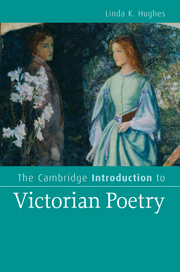Book contents
- Frontmatter
- Contents
- List of figures
- Preface
- Acknowledgments
- Editions cited
- Introducing Victorian poetry
- Part I The forms of Victorian poetry
- 1 Victorian experimentalism
- 2 Victorian dialogues with poetic tradition
- 3 The impress of print: poems, periodicals, novels
- Part II The rhetoric of Victorian poetry
- Part III Coda Close readings
- Glossary
- Notes
- Further reading
- Index
- Cambridge Introductions to Literature
2 - Victorian dialogues with poetic tradition
Published online by Cambridge University Press: 05 June 2012
- Frontmatter
- Contents
- List of figures
- Preface
- Acknowledgments
- Editions cited
- Introducing Victorian poetry
- Part I The forms of Victorian poetry
- 1 Victorian experimentalism
- 2 Victorian dialogues with poetic tradition
- 3 The impress of print: poems, periodicals, novels
- Part II The rhetoric of Victorian poetry
- Part III Coda Close readings
- Glossary
- Notes
- Further reading
- Index
- Cambridge Introductions to Literature
Summary
Here Homer, with the broad suspense
Of thunderous brows, and lips intense
Of garrulous god-innocence.
There Shakespeare, on whose forehead climb
The crowns o' the world: O eyes sublime
With tears and laughters for all time!
Elizabeth Barrett Browning, “A Vision of Poets” (1844)Poets' use of inherited subject matter and forms such as the ode, sonnet, or ballad entails a conversation with poetic precursors and consideration of how well readers will understand each adaptation or break with tradition. Drawing on tradition can impart authority or cultural prestige to new work, enable greater poetic force and economy through allusion, inspire poets to new inventiveness in meeting formal challenges, attract connoisseurs who appreciate the niceties of adaptation, foster a poet's expression of solidarity with a community or ideological orientation, or highlight local experimentalism within a larger bow to precedent. Poets thus offer competing visions of how tradition should be approached, entering into dialogue with the living as well as the dead. The first question to pose of a Victorian poem adapting inherited material and forms, then, is how the poet is appropriating poetic tradition and to what artistic and cultural end. Though references to classical and modern European precedent often overlap, as in Barrett Browning's citation of Homer and Shakespeare in “A Vision of Poets,” they are treated separately below to give some shape to a broad, amorphous, yet vital issue in Victorian poetry.
- Type
- Chapter
- Information
- The Cambridge Introduction to Victorian Poetry , pp. 40 - 88Publisher: Cambridge University PressPrint publication year: 2010



